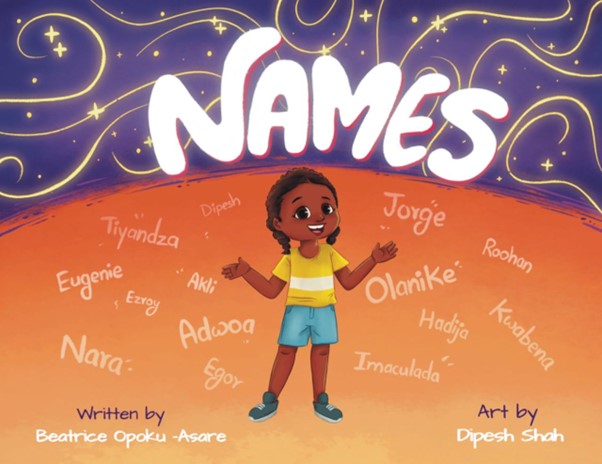Title: NAMES
Author: Beatrice Opoku-Asare
Number of pages: 36
Year of publication: 2023
Publisher: Lumière Creatif
Reviewer: Samuel Agyeman-Prempeh
Brief about the book: A children’s book that highlights the importance of names and the need to pronounce one’s name properly.
For someone who has not read a lot of children’s books authored by Ghanaians, I was sceptical about Names. The title leaves you with a lot of questions as to what the story is about. I was pleasantly disappointed. Names, by Beatrice Opoku-Asare, is a children’s book that draws you in with its beautiful, refreshing cover page. A win for the African child as a gorgeous, little girl glows on the cover of the book with amazing, indigenous names surrounding her.
Inspired by her own experiences and her children’s frustrations with people mispronouncing their names whenever they mentioned it, this book is one that resonates with a lot of people with indigenous and unique names. Set in the United States of America, I surprisingly find myself relating to what Adwoa, the main character, goes through in the book.
Names are powerful identifiers, and it hurts to constantly hear your name mispronounced. The author beautifully tells a story and articulates what many have experienced, and helps tackle this problem at the end of the book. Instead of a vindictive tone, the author uses a gentle approach to show that these mispronunciations are not intended, contrary to what many narratives assert.
The illustrations in the book take this masterpiece a notch higher. It beautifully adds up to the story instead of taking from it. The representation of the African child is refreshing to see and a great way to change the stereotype made over the years. It is an announcement that black is beautiful and indigenous names are enchanting.
The wording of the story is basic as expected for children. It also breaks down the complexities of name, cultural sensitivity and identity to everyone who reads it without the hard-hitting awkwardness that comes with such discussions. There is empathy for both the person bearing names that are mispronounced and those who mispronounce them.
Thankfully, the author does not drag the story. It is concise and sticks to the central theme of the story. This is commendable as a section of the target audience of the book might get confused if the story went on and on.
For a first-time author, Beatrice Opoku-Asare did incredibly well, especially with this masterpiece in the form of a children’s book. It hooks you from the beginning and gives you more to the very end. All in all, this book is a great addition to your library and highly recommended for your child.
The book will be out soon with e-books available on Amazon, Sayda Hub, Selar and Booknook to cater for everyone, irrespective of their location.
The author, Beatrice Opoku-Asare, is a Ghanaian who spends her time in Ghana and the United States of America. A wife and mother of two wonderful children. This is her first book.










